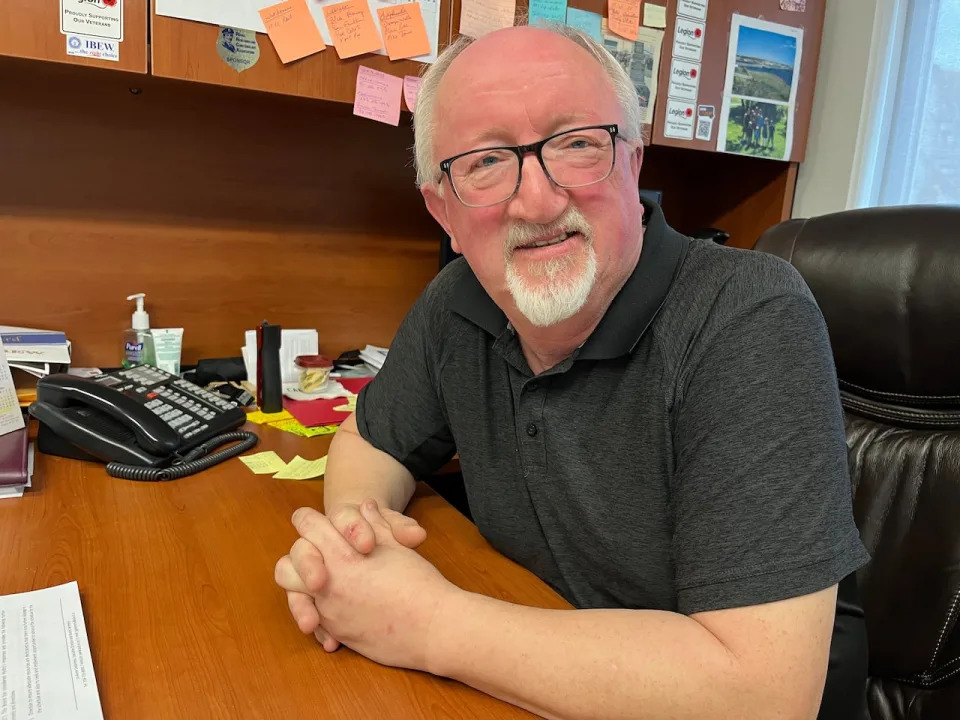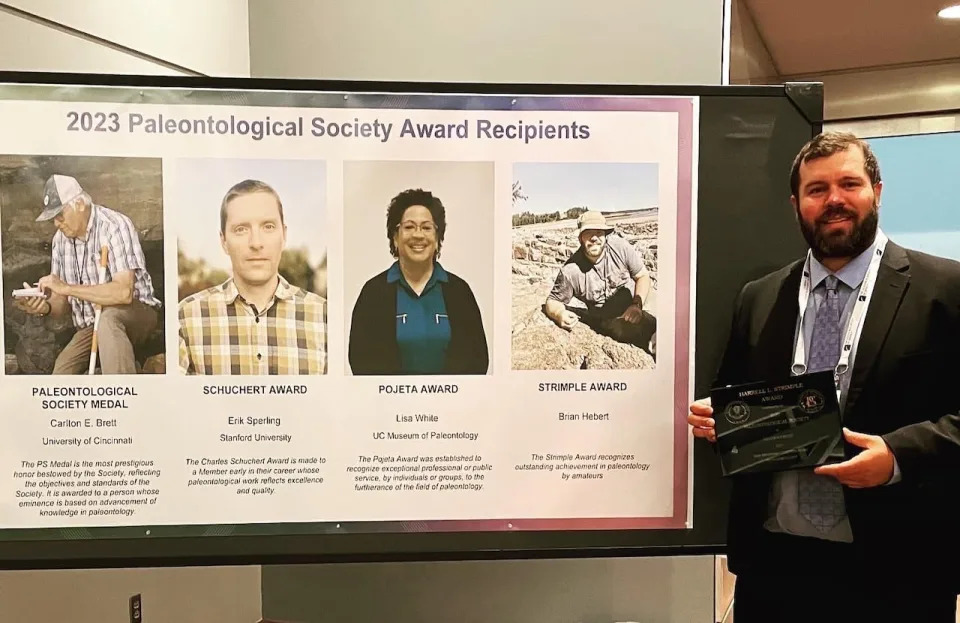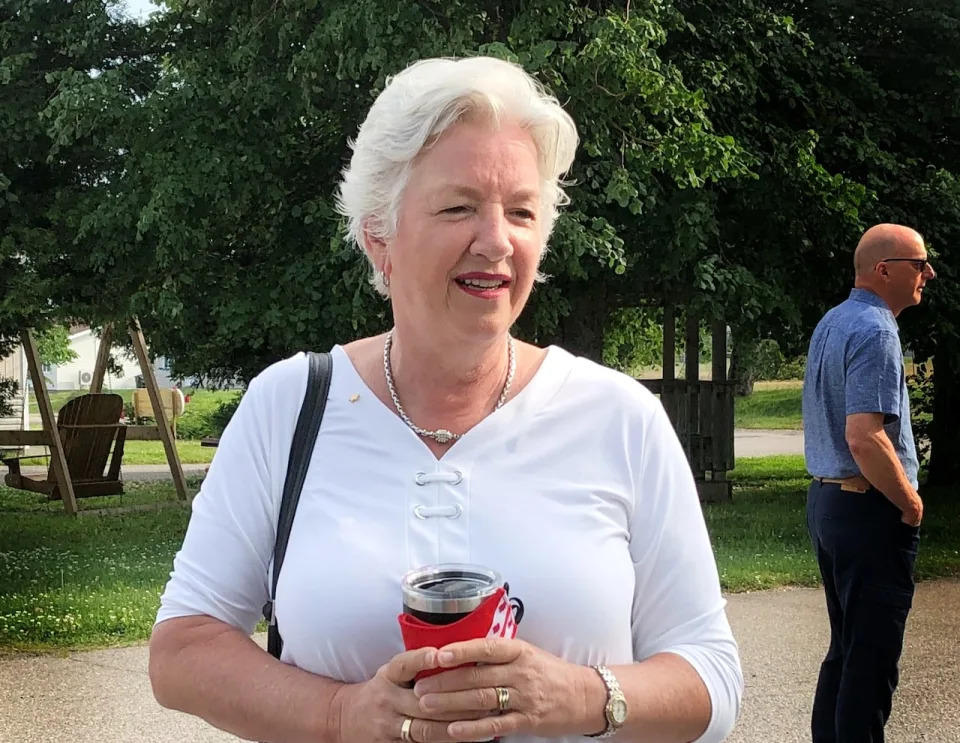Rogers Communications reaches tentative agreement with Metro Vancouver technicians
CBC
Sat, November 18, 2023

In late September, nearly 300 former Shaw technicians absorbed by Rogers during the companies' merger overwhelmingly voted to strike amid concerns over job security. (Sean Kilpatrick/The Canadian Press - image credit)
Metro Vancouver workers at Rogers Communications Inc., have reached a tentative agreement with the company, the union representing the workers announced Friday evening.
Corey Mandryk, regional executive officer of the United Steelworkers (USW) union, said he hopes the tentative agreement will be ratified on Monday so workers can get back to the job by Wednesday.
The union represents Rogers workers who were formerly with Shaw, who support homes and businesses for Internet, phone and television services in Metro Vancouver under their Local 1944, Unit 60 chapter.
"We have had labour peace with Shaw for the last 23 years. Rogers did a big buyout, came in, and the first thing they did was lock out almost 300 workers," said Mandryk.
"It's been a long two-and-a-half weeks for these guys."

Jagmeet Singh and Jenny Kwan joined United Steelworkers Rogers employees on the picket line Saturday morning.
Jagmeet Singh and Jenny Kwan joined United Steelworkers Rogers employees on the picket line Saturday morning. (Janella Hamilton/CBC)
In late September, nearly 300 former Shaw technicians absorbed by Rogers during the companies' merger overwhelmingly voted to strike amid concerns over job security.
Shortly after the union issued a strike notice, Rogers locked out the nearly 300 technicians from their jobs.
Rogers confirmed they reached a tentative agreement in a statement.
"Our goal has always been to achieve a negotiated settlement that meets the needs of our employees and our customers," said Rogers spokesperson Cam Gordon.

*
The union announced Friday it had reached a tentative agreement with Rogers and hopes it will be ratified Monday. (Janella Hamilton/CBC)
NDP leader Jagmeet Singh and Vancouver East MP Jenny Kwan joined Rogers employees on the picket line to celebrate the tentative agreement Saturday morning.
"They wanted security and they wanted a fair wage," said Singh. "These are things that all workers deserve."
New contract will put N.L. Hydro workers on par with utilities in the Maritimes
CBC
Sun, November 19, 2023

Jabez Lane, business manager of International Brotherhood of Electrical Workers Local 1615, says the union achieved all its bargaining goals in negotiating a new deal. (Terry Roberts/CBC - image credit)
Roughly 650 unionized N.L. Hydro employees have accepted a new contract that will see their wages climb to a level equivalent to other public utility workers in Atlantic Canada.
The workers include power line technicians, the people who operate power generating stations and substations, and administrative employees.
The employees are are represented by the International Brotherhood of Electrical Workers Local 1615.
A tentative agreement was reached in September offering annual increases of two per cent over four years, which is consistent with the pattern bargaining for other public service unions in the province.
N.L. Hydro also agreed to a so-called "Atlantic adjustment" that will increase remuneration by roughly five per cent more during the contract, which expires in 2026.
Employees will also receive a $2,000 signing bonus.
"I don't think I'm calling the windfall, but it's just a matter of bringing [unionized workers] to where they should be in comparison to other people in the industry," said Local 1615 business manager Jabez Lane.
"We are a utility industry. We are at Crown Corporation. We deserve to be paid the same as other people in our industry, and that's where we'll be."
The old contract expired in April 2022, which means the the new agreement will include retroactive pay.
A tentative agreement was reached in September, with the help of a conciliator, with ratification votes taking place throughout the province in recent weeks.
There are three separate collective agreements, said Lane, and the acceptance rate for each was above 75 per cent.
Lane said the union achieved all three of its goals: no concessions, no two-tiered wage increases, and Atlantic parity with Crown-owned utilities in Nova Scotia and New Brunswick.
But Lane said efforts to provide more job security for the 80-plus union members who work at the Holyrood thermal generating station have so far fallen short.

US-based Liberty Consulting Group was known for keeping a watchful eye on N.L. Hydro.
The new collective agreement between N.L. Hydro and IBEW 1615 is retroactive to April 2022 and includes increases that will bring unionized employees up to par with their counterparts who work at public utilities in other Atlantic provinces. (Patrick Butler/Radio-Canada)
The station has a capacity of 490 megawatts, uses heavily polluting fuel oil, and is a critical power supply for the Avalon Peninsula.
One of the arguments for building Muskrat Falls and the Labrador-Island Link — commonly known as the LIL — was that it would allow for the closure of Holyrood and eliminate the emissions that result from its operation. But there are reliability concerns with the LIL, and Hydro and the utility regulator have both said Holyrood will be needed until at least 2030.
Because of the uncertainty over its future, Hydro has been reluctant to grant full-time employee status to workers at Holyrood, and roughly half of the workforce receive full benefits but have term employment status.
The union was hoping to convert more of those jobs to full time because Holyrood will be operating for up to another decade, said Lane, but Hydro resisted.
He said both sides agreed to continue talks on the matter, and "we intend on pursuing that fairly quickly."
The new contract expires in 2026.
Dozens gather in Halifax in support of striking Pete's Frootique workers
CBC
Sun, November 19, 2023

Workers at Pete's Frootique in downtown Halifax went on strike on Saturday. (Vernon Ramesar/CBC - image credit)
Dozens gathered on Dresden Row in downtown Halifax on Sunday afternoon in solidarity with striking Pete's Frootique workers.
The strike began Saturday.
The workers at the Dresden Row location voted to join the Service Employees International Union in 2022. The union says it has been unable to negotiate a contract with Sobeys, which owns Pete's Frootique.
Pete's Frootique announced on social media Saturday that its downtown store is closing indefinitely.
The workers are seeking better pay. Union representatives at the rally told those gathered that most workers are now working for minimum wage and that the last offer made to them by the company called for a wage increase of five cents per hour.
Terry Armour, who works in the market's produce department, said the show of solidarity is important and would show Sobeys that workers are serious about their demands.

Terry Armour works in the produce department of the supermarket.
Terry Armour works in the market's produce department. (Vernon Ramesar/CBC),
Armour said he wasn't surprised when the company announced it was closing the Dresden Row location indefinitely.
"I don't think they have much choice," he said. "They can't run the place without us and we're standing out here demanding a better wage."
He said had the union accepted the last offer from Sobeys it would have meant an increase of $4.55 in his cheque based on his 91-hour pay period.
Serena Gagne, the picket captain for the striking workers, is a front-end supervisor at the store and has worked there for four years.

Serena Gagne has worked at Pete's Frootique for four years. (Vernon Ramesar/CBC)
She said she was excited and happy about the number of people who attended the rally. Gagne said it was heartwarming to see the community come out in support.
"We have lots of employees who, including myself, only make $15 an hour and we all know that right now in Halifax a livable wage is $26.50," she said.
"That's just not acceptable for Pete's and Sobeys, who have offered us a five-cent raise. I believe that we're all here fighting to get a better raise than that."

Wynn Meaney used to work at the market and came to the rally to support his former colleagues. (Vernon Ramesar/CBCr?CBNC)
Wynn Meaney, a former worker at the store, said he came out to support his former colleagues because he didn't want them "to have to struggle anymore."
He said he left because of low wages and a lack of support from upper management at the store.
He said he believes the union will achieve its goals and thinks it will likely be achieved because of pressure from the public and not because of any goodwill from the company.
In a statement emailed to CBC News late Sunday evening, a spokesperson for Sobeys said the company is disappointed in the decision to strike. The company said it worked hard to reach an agreement it considers "fair and competitive."
"We are hopeful this will be resolved as quickly as possible and are ready and willing to get back to the table with the union as soon as the SEIU Local 2 leadership is ready," the email said.
The Pete's Frootique location in Bedford remains open.
ONTARIO
Plan to bring in South Korean workers for NextStar battery plant sparks backlash
CBC
Mon, November 20, 2023

The NextStar EV battery plant in Windsor, Ont., is shown under construction in the summer of 2023. ( Patrick Morrell/CBC - image credit)
Workers from South Korea will be coming to work on Windsor's NextStar EV battery factory, sparking backlash from politicians who say the jobs should go to Canadians because of the massive taxpayer subsidies the companies received.
The NextStar EV battery factory, a partnership between Stellantis and LG Energy Solution, received about $15 billion in subsidies from the federal and provincial governments.
Windsor's police chief met with the South Korean ambassador last week ahead of the arrival of the workers next year. According to a social media post from the police service, about 1,600 South Korean workers are coming to Windsor for the project.
When asked for comment, the company said in a statement that it was "fully committed" to hiring more than 2,500 Canadians and 2,300 local tradespeople for the construction and equipment installation.
"The equipment installation phase of the project requires additional temporary specialized global supplier staff who have proprietary knowledge and specialized expertise that is critical to the successful construction and launch of Canada's first large-scale battery manufacturing facility," said NextStar CEO Danis Lee in a statement.
Federal Conservative leader Pierre Poilievre raised the issue in a news conference on Monday, calling for an inquiry into how many of the jobs will go to temporary foreign workers.
"And now we learn that the $15-billion grant to the Stellantis plant will fund mostly jobs for non Canadians — not immigrants, we love jobs for immigrants — jobs for people who are not Canadian citizens and will not be Canadian citizens," he said.
"They will come here, get a taxpayer-funded paycheque and take it back to their country."
Over the summer, NextStar began hiring for the first 130 jobs at the facility, including for roles in HR, communications and finance as well as engineers.
On Monday, Unifor national president Lana Payne said reports on the matter raised "serious flags" for the union, which represents workers at Stellantis' Windsor Assembly Plant.
"We believe the shift to electric vehicles must be led by good jobs, with union contracts, for workers in Canada," Payne said. "Workers should not be subject to exploitative hiring programs, like the Temporary Foreign Workers Program, that was significantly expanded under the Harper Conservatives but also endorsed by consecutive federal governments, Payne said.
But, she said, clarifying statements from the company have "alleviated some of our union's immediate concerns."
"To be clear, our union will closely monitor the hiring process to ensure Canadian workers are first to benefit from this historic investment in the auto sector and that NextStar fulfils its stated commitment to good jobs in Canada."
On Friday, MPP Lisa Gretzky (NDP-Windsor West) wrote to Premier Doug Ford and provincial labour minister David Piccini noting "significant concern that NextStar and potentially many others in the EV battery supply chain will be relying on temporary foreign workers rather than local workers to build and operate the facility."
More to come.
FRIENDLY FIRE
IDF combat helicopter targeting Hamas fighters at Nova festival massacre shot some partygoers by mistake, says Haaretz
Rebecca Rommen
Updated Mon, November 20, 2023

An aerial view shows the burnt cars of festival-goers at the site of an attack on the Nova Festival by Hamas gunmen from Gaza, near Israel's border with the Gaza Strip, in southern Israel, October 12, 2023.REUTERS
The IDF mistakenly hit Nova festival attendees while aiming for Hamas militants, Haaretz reported.
A police source told the outlet that helicopter fire may have missed its mark.
Israeli officials pushed back against the report after it was published.
An Israeli police investigation into the music-festival massacre on October 7 indicates that the IDF mistakenly shot some festival attendees while firing at Hamas, a report suggested.
The alleged debacle was reported by the Israeli newspaper Haaretz, citing an unnamed police source.
The source told Haaretz that their police investigation said an IDF combat helicopter fired at Hamas fighters after arriving on the scene. While targeting the perpetrators, the helicopter also hit some festivalgoers, the source said.
Business Insider reached out to Josh Breiner, the Haaretz journalist who broke this story, for comment.
After Haaretz published its report, Israel Police released a statement pushing back. It said, per The Times of Israel, that the actions of the IDF were beyond the remit of the investigation the source was speaking about.
It also asked that media outlets only report information from government officials.
364 people were killed at the festival, a third of the fatalities from Hamas militants' coordinated terrorist attacks on Israel on October 7, per The Times of Israel.
Israeli security's assessment is that Hamas did not have advance knowledge of the Nova music festival next to Kibbutz Re'im, and targeted it spontaneously after infiltrating Gaza's border, Haaretz reported.
The festival was initially billed to end on Friday night and only extended to Saturday, late in the day, it said.
Approximately 3,500 people attended the psychedelic trance festival three miles away from the Gaza border, per The New York Times.
Alongside the fatalities, dozens of festival attendees were kidnapped and taken to Gaza. A video of 25-year-old Noa Argamani being hoisted onto a motorcycle by militants while calling for her boyfriend went viral on social media.
Israeli helicopter opened fire on Israelis in festival during Hamas attack on October 7: Report
November 19, 2023

An Israeli air force attack helicopter on November 17, 2023 [JACK GUEZ/AFP via Getty Images]
A new report revealed Saturday that an Israeli military helicopter opened fire on Palestinian gunmen but wounded Israelis participating in a festival during an October 7 attack by Hamas against Israel.
The Haaretz newspaper said an Israeli security assessment was based on an investigation by police with Hamas gunmen who were arrested October 7.
Haaretz reported that the military helicopter arrived at the site of the festival and opened fire on the gunmen but also wounded several festival participants.
It said, according to the assessment, the gunmen had no prior information about the festival which was held close to the Kibbutz Re’im, near the borders with Gaza.
Israel’s Yedioth Ahronoth newspaper also published a report on Israeli Air Force helicopters intervening in the attack carried out by Hamas from Gaza on October 7.
The newspaper reported that the Israeli forces “found it difficult to identify Hamas militants,” adding that helicopter pilots “used artillery” against civilians at the festival.
“The Hamas terrorists were instructed to slowly blend in with the crowd and not to move under any circumstances,” the newspaper said in its report.
“In this way, they tried to fool the air force into believing that those below were Israelis. This deception worked for a while, until the Apache helicopters had to break free of all restraints. The pilots found it difficult to distinguish who was a terrorist and who was an Israeli,” the report added.
READ: Hamas didn’t know about music festival in advance says Israel police
The newspaper said that “when they realised that, some of them decided to use artillery shells against the terrorists independently, without getting permission from their superiors.”
Police estimated that the number killed in the festival was 364, but did not reveal their identities.
The investigation details are contrary to the official Israeli narrative on the attack by the Palestinian resistance group which claimed Hamas gunmen slaughtered the revelers in the festival.
Hundreds of Hamas fighters crossed into Israel in a surprise operation named “Al-Aqsa Flood,” triggering an Israeli retaliatory bloody onslaught on the Gaza Strip.
Israel has killed more than 12,300 Palestinians in its air and ground attacks on the Gaza Strip since the surprise offensive by Hamas. The official Israeli death toll, meanwhile, stands at about 1,200.
Thousands of buildings, including hospitals, mosques, and churches, have either been damaged or destroyed in Israel’s relentless strikes on the besieged enclave.
An Israeli blockade has also cut Gaza off from fuel, electricity, and water supplies, and reduced aid deliveries to a trickle.
Israel has rejected growing calls for a cease-fire until the release of hostages held by Hamas.
INTER IMPERIALIST RIVALRY FOR HEGEMONY
In Africa, Trump saw 'huts.' Biden sees opportunity to curb President Xi's growing influence
Michael Collins, USA TODAY
Sun, November 19, 2023
WASHINGTON – When Donald Trump looked at Africa, he crudely dismissed its significance and fretted African immigrants would never “go back to their huts” once they entered the United States.
When Joe Biden looks at Africa, he sees opportunities to curb China’s growing influence in the world.
Biden has sought to move beyond Trump’s dismissive, sometimes confrontational approach and focus instead on deepening ties with a continent that is home to a rapidly growing population and stands as a potentially important geopolitical partner.
“Our eyes are fixed squarely on the future,” Biden told a small group of African leaders in Washington last year.
But beneath the promissory oratory lies a more strategic reason for the shift in attitude and approach to U.S.-Africa policy.
“It’s about China,” said Mark Green, former ambassador to Tanzania and president of the Wilson Center, a nonpartisan think tank that focuses on global affairs. “It’s about great power, competition.”
On Wednesday, Biden and Chinese President Xi Jinping met in person for the second time since Biden became president. The four-hour meeting, held on the sidelines of the Asia-Pacific Economic Cooperative conference in San Francisco, comes as the two leaders work to repair relations deeply strained by a trade war that started when Trump was in office and by clashes over technology, China’s aggression against Taiwan and a Chinese spy balloon that flew over the United States earlier this year until a U.S. fighter jet shot it down.
In his opening remarks, Biden told Xi the two leaders must ensure that competition between their countries “does not veer into conflict.”
“We have to manage it responsibly – that competition,” Biden said. “That’s what the United States want and what we intend to do. I also believe that's what the world wants from both of us: candid exchange.”
Xi said that while the China-U.S. relationship has never been smoothing sailing, “it has kept moving forward amid twists and turns.”
“Planet Earth is big enough for the two countries to succeed, and one country’s success is an opportunity for the other,” he said.
Neither leader acknowledged, at least not publicly, the newest arena in the competition between the two economic giants: Africa.
'You're going to be seeing a lot of us': China has far surpassed the US as an economic player in Africa. Can Biden change that?

President Joe Biden greets Senegalese President Macky Sall during the U.S.-Africa Leaders Summit in Washington last December.
'New kid on the block in Africa'
China, an economic and military rival of the United States, has made significant gains in Africa over the past two decades, setting off alarms in the U.S. and among European countries who fear Beijing’s growing influence in the world.
“China in the 2000s became the new kid on the block in Africa,” said Amaka Anku, who heads the Africa practice for the Eurasia Group, a global political risk consulting firm based in New York City.
China has far surpassed the U.S. as an economic player in Africa. Trade between China and Africa hit $254 billion in 2021 – four times the trade between the U.S. and Africa, according to the United States Institute of Peace, a nonpartisan, nonprofit organization founded by Congress.
China is the largest provider of foreign direct investment in Africa, supporting hundreds of thousands of African jobs – roughly double the level of U.S. foreign direct investment on the continent. China is also by far the largest lender to African countries, often providing loans that come with much more favorable terms than those offered by U.S. lenders.
What’s more, the Chinese have been pushing to establish a military base on Africa’s western coast – a particular concern for the Biden administration, which sees China as the most consequential threat to U.S. national security.
“This is a crossroads moment for U.S.-Africa relations,” Green said. “And I think it’s important that we continue to build relationships.”
The best way to do that, he said, is for the president to set foot in Africa – “quite frankly, the sooner, the better.”
'All in on Africa's future': Biden announces trade, infrastructure investments in Africa
Biden has said he plans to visit Africa this year, although no plans have been announced, and with just six weeks left in 2023, a trip there this year seems unlikely. The White House, pressed by reporters on whether Biden plans to keep his promise to visit before the end of the year, has simply said that it has no update on his travel schedule.
Biden insists his goal is not to contain China, and his administration has downplayed suggestions that his interest in Africa is tied to a desire to curb Chinese influence there.
Besides the economy, analysts say there are multiple reasons for the U.S. to engage with Africa, not the least of which is the rise of authoritarianism on the continent – a concern for the U.S. and other democracies. Africa also has the world’s youngest population. The top 10 countries with the lowest median age are there, according to the Wilson Center.
The African Union, which represents the continent’s 54 countries, is pushing for a permanent seat or seats on the U.N. National Security Council, which would provide some of the respect the continent has long sought on the world stage.
Biden has publicly supported not only giving Africa a permanent seat at the U.N. but adding the African Union to the Group of 20 nations. South Africa is currently the only African member of the G-20, a governmental forum made up of the world’s major industrial and emerging countries.
'Well, look, he is': Biden calls China's Xi a dictator again, upsetting Beijing after high-stakes meeting
'African leaders don't want to be chess pieces'
Trump didn’t exactly endear himself to Africans during the four years he was in office. He never visited Africa during his presidency, making him the first president since Ronald Reagan to never set foot on the continent while in office.
Trump’s incendiary language didn’t help, either.
During an Oval Office meeting with lawmakers about immigration, he questioned why the U.S. would accept more migrants from Haiti and “sh**hole countries” in Africa rather than places like Norway. In a separate meeting a few months earlier, he reportedly groused that thousands of Haitians who’d entered the United States had AIDS and that Nigerian visitors would never “go back to their huts” in Africa. Critics called his remarks derogatory and racist.
Biden sought to reset relations with Africa upon taking office. Last December, the administration hosted the first U.S.-Africa Leaders Summit since 2014. Heads of state from 49 African nations and the African Union were invited to Washington for an opportunity to re-engage with the Biden administration.
To underscore its commitment to Africa, the U.S. has promised to send $55 billion to Africa over the next three years for initiatives to improve health care, mitigate the dangers of climate change, boost trade and investment and set up programs to help women entrepreneurs.
And while Biden has yet to visit, first lady Jill Biden, Vice President Kamala Harris, Secretary of State Antony Blinken and other administration officials have traveled to the continent over the past year, promising the U.S. is serious about deepening its ties to Africa.
Whenever Biden makes the trip, African leaders will be looking for more than promises from the administration, analysts said.
They will be looking for a signal that the U.S. considers the region important – and not just as a buffer against China, Green said.
“African leaders don’t want to be chess pieces,” he said.
African countries need funding to help them finance critical development initiatives, infrastructure projects and climate change mitigation, said Rama Yade, senior director of the Atlantic Council’s Africa Center.
“They have development needs of $200 billion per year, and that is absolutely key,” she said. “Six hundred million people suffer from a lack of electricity, not to mention food insecurity, problems of housing, of transportation, of infrastructure. Those are critical.”
African leaders are willing to work so closely with China, Yade said, “because the Chinese – they bring money.”
The U.S. government’s announcement of funding programs for Africa in the past has always come with the promise of millions of dollars in accompanying investments from the private sector. But the private sector funding seldom materializes, Anku said.
For now, “I think what African countries would like to see is ‘show me the money,’” she said.
While Africa has many big-ticket needs, smaller projects or those that directly benefit communities can sometimes have the most lasting impact, Green said.
Green came to realize that soon after he was named ambassador to Tanzania and landed in Dar es Salaam to present his credentials. The arrival of a new ambassador is a big deal, with lots of limousines and a ceremony filled with pomp and circumstance. But what Green remembers most about that day is his cab driver.
“Before we took off, he turned around, leaned (over) to me and he said, ‘I was taught by a Peace Corps teacher,’ and he returned to the wheel,” Green said. “For him, that was the big deal, not the formalities. It was American compassion and action.”
“That, to me,” Green added, “is how you make a difference.”
Michael Collins covers the White House. Follow him on Twitter @mcollinsNEWS.
PEPFAR: Long a bipartisan effort, a program to fight global HIV is stuck in Washington gridlock
This article originally appeared on USA TODAY: Why Biden sees Africa as opportunity to curb China's influence
A look at why The Hate U Give was removed from Nova Scotia school curriculums
CBC
Sun, November 19, 2023

The Hate U Give is about a Black high school student who struggles with identity and trauma after she witnesses a police officer shoot and kill her friend. (Harper Collins - image credit)
The decision to drop the American young adult novel The Hate U Give from Nova Scotia school curriculums appears to have been made before the Department of Education received or saw any formal complaints, according to newly released documents.
In September, CBC News reported the department removed the award-winning book, which is about a Black high school student who struggles with identity and trauma after she witnesses a police officer shoot and kill her friend, from its authorized learning resource list.
The book, however, is still available for students to read on their own if school libraries choose to carry it.
An official with the department's African Canadian services branch told CBC Radio's Information Morning Halifax that they had received two complaints about the book, including one from a parent and one from an employee of a regional centre for education, due to its use of the N-word and other profanities, which spurred the decision to delist the book.
"The resource was identified by some of our regional centres as being problematic," Paul Ash said in September.
"We reviewed the resource based on the concerns that they expressed and agreed, and we decided to remove it off of the authorized learning resources."
LISTEN | A full debrief about what was learned from the request:
Following that conversation, CBC News requested more information about the complaints and how the decision to drop the book was made by filing a freedom of information request.
That request yielded several pages of email correspondence between staff at the Department of Education that revealed some details about one complaint and more information about the process — as well as feedback from some educators who had questions about how a decision like this is made.
It also showed that the department delisted the book in October 2022, prior to the one complaint included in the records.
One complaint on record
The documents didn't contain any records of a complaint from a parent. The department said a regional centre for education received one but it did not forward a record directly.
The one complaint included in the documents came from an equity and human rights consultant employed by a regional centre for education. It's unclear if that is the same complaint from a regional centre that Ash referred to in his interview.
"This book is problematic given its language content," Joe Bishara wrote in an email to an official with the Education Department on Jan. 25, 2023. He continued to say that it failed to measure up against the department's Know the Signals assessment tool.
That assessment tool was implemented in 2021, and is used by the department to determine what resources are appropriate to use in schools when teaching topics that affect and reflect the Black community.
The documents revealed that the book had been reviewed using this guide during the 2021-22 school year, but staff couldn't come to a conclusion on it. The records released to CBC do not detail if anything specific prompted the review.
Tracy Griffin, the department official who responded to Bishara earlier this year, agreed that the book "does not pass Know the Signals," and that was the reason it was delisted.
The Know the Signals guide has three different categories, including Stop: Do Not Use, Wait: Consult and Go: Use.
The first category outlines criteria for when material shouldn't be used in schools, including any resource that "depicts violence towards a group of Black individuals and has the potential to expose students to traumatizing events and images."
It also says a material shouldn't be used if it uses racist terms or portrays Black and African Nova Scotians from a "deficit, stereotypical and racist perspective."
The Hate U Give does depict violence against a Black individual and some Black characters use the N-word.
Teacher weighs in
The documents showed that some teachers had concerns about the delisting process, including one who voiced her opinion to the department via email.
"It feels very uncomfortable to censor books (as a white teacher in particular) that are first voices like Angie Thomas, Nic Stone, Alice Walker, Lawrence Hill, etc.," Tammie Landry, a literacy facilitator for Halifax Regional Centre for Education, wrote in May 2023.
"Are we sending the message that the topics, experiences, language a Black author chooses to use are not welcome as a choice in high school? How do we address systemic racism and disrupt inequalities from our history, without the history?"
When CBC News first reported the delisting of The Hate U Give, an official with the Education Department said it's working closely with the African Canadian Services branch to select a number of resources that would provide education about African Nova Scotia cultures, histories and contributions.
The documents also noted that teachers had asked whether there was a central list of delisted resources, including the reasons, but officials said there was no such list — or at least not at the time.
CBC News contacted the Education Department for an interview to clarify how and when the decision was made, but it was unable to accommodate the request.
"The Department of Education and Early Childhood Development is committed to inclusive education," the spokesperson said in an email.
Education and understanding
Following CBC's coverage, Kesa Munroe-Anderson, a professor at Acadia University's School of Education, said before material like The Hate U Give can be taught in schools, there must be uniform and mandatory training that prepares all teachers to teach it in a culturally responsive way.
"The only way to improve that situation is through education and understanding. First of all, we must learn to be comfortable with uncomfortable topics of discussion like racism and anti-Black racism in this province and in this country," Munroe-Andrerson told Information Morning.
"We need to have critical, courageous conversations where we can engage in critical social justice using an equity lens and anti-racism lens in general in society and then specifically in schools."
For more stories about the experiences of Black Canadians — from anti-Black racism to success stories within the Black community — check out Being Black in Canada, a CBC project Black Canadians can be proud of. You can read more stories here.
'It's a huge honour': Amateur paleontologist from N.S. wins international award
CBC
Sun, November 19, 2023

In 2020, Brian Hebert discovered a 315-million-year-old reptile fossil in Nova Scotia. (Brian Hebert - image credit)
Brian Hebert's life changed in an instant while out for a walk with his father about 30 years ago.
While walking around the small town of Joggins, N.S., a UNESCO world heritage site along the Bay of Fundy, Hebert stumbled upon a fossil.
He was fascinated from that moment. He began visiting the local library everyday to scan through hundreds of scientific journals and fossilized records.
In October, Hebert, 44, received an international award when he attended the Geological Survey of America Conference in Pittsburgh. The Harrell L. Strimple Award is given to an amateur paleontologist for their contributions to paleontology.
Hebert is the first Nova Scotian to receive the award.
"It's a huge honour," he said. "People might not know how important the award is. In our world, it's the highest honour I'm ever going to get for paleontology."
In 2020, Hebert discovered a 315-million-year-old reptile fossil in Nova Scotia, which he called Dendromaia unamakiensis, meaning tree mother from Cape Breton. The discovery of an adult and baby reptile fossilized side by side was something nobody had ever seen before, he said.
'He's just remarkable'
John Calder, a Nova Scotian geologist, nominated Hebert after years of collaboration.
Calder met Hebert, then a teenager, while searching for fossils by the Joggins Cliffs. Calder had a conversation with him about paleontology and was struck with how knowledgeable he was.
"There's none like Brian," Calder said. "This gift to know where fossils might be is not chance discovery."
Hebert said a childhood friend reached out to him after the award was announced, saying people don't realize the hours that go into it.
"For a while it was going to school, coming home and then heading down to the beach to try to find something else," Hebert said.
Hebert said it takes a strong will to spend everyday exploring for rock formations, minerals or any signs of a potential fossil. He said he often didn't know if he would find anything, but that just made it fun.
'You're 12 years old and there's PhDs at your door'
A few years after their first encounter, Calder kept tabs on Hebert's progress. He recalled a time when he invited a visiting scientist from the United Kingdom to Hebert's home to see the prodigy's new discovery. Hebert presented the two men with a fossil wrapped in newspaper.
"He asked if we agreed with his preliminary identification that it was the skull roof of an ancient fish called haplolepis," Calder said.
"We didn't say anything, we just looked at each other, wide eyed, and then slowly turned our eyes back to Brian. Like, how did you know that?"
Calder said they were flabbergasted by the hypothesis and weren't sure if it was true.
"He was right," he said. "I don't know anyone else in the world that has this ability."
P.E.I. partners with researchers looking into STI testing at pharmacies
CBC
Mon, November 20, 2023

Blood test kit for sexually transmitted infections. A group of researchers with Memorial University's School of Pharmacy has partnered with organizations and government agencies across Canada — including Health P.E.I. — to explore testing for such diseases at community pharmacies. (Craig Chivers/CBC - image credit)
A new study wants to look into how making testing for sexually transmitted and blood-borne infections (STBBIs) more accessible can impact the health of Prince Edward Islanders.
A group of researchers with Memorial University's School of Pharmacy has partnered with organizations and government agencies across Canada — including Health P.E.I. — to explore testing for such diseases at community pharmacies.
The team has been granted $2 million in federal funding. Some pharmacies in Nova Scotia, Newfoundland and Alberta are already offering accessible testing for HIV, hepatitis C and syphilis as part of the study.
Debbie Kelly, director of the Medication Therapy Services Clinic at the MUN School of Pharmacy, is leading the project.
"Just like if you were going to get counselled about how to inject yourself with insulin, for example, you'd be taken into the private counselling room in the pharmacy," she said. "The pharmacist would describe to you … sort of the benefits and the limitations of the different tests, and then they would administer the tests."
Point-of-care tests for HIV, hepatitis C and syphilis tests provide patients with results right away, though if they're reactive they still have to be confirmed by a lab.
Results for dry spot tests, which only require the prick of a finger, take a couple of weeks, Kelly said.
"In the model that we've been studying, the pharmacist can provide a blood work requisition right away. So you can go to the lab and get your blood work done and a direct referral to a physician or a nurse," she said.
"If it's negative, then you can get education about how you can protect yourself in future."
More options
Kelly said the pharmacy model has shown to be especially successful for vulnerable populations and the LGBTQ community.
Providing easier access to STBBI diagnosis and testing is one of the key points of the provincial government's new strategy on the file, which the province's chief public health officer says is still under development.

Pharmacy plus originally launched with over 30 ailments that could be assessed by a pharmacist. The program expanded last month to now include hormonal contraception, shingles and impetigo.
Pharmacy Plus originally launched with over 30 ailments that could be assessed by a pharmacist. (Nicola MacLeod/CBC)
Dr. Heather Morrison told CBC News earlier this month the province has already improved the ability to treat STBBIs at P.E.I.'s Sexual Health, Options and Reproductive Services clinic and UPEI's Health and Wellness Centre.
Morrison said the CPHO is also working with other community organizations to make testing more accessible.
Meanwhile, the province is still working to fill gaps in primary care through its Pharmacy Plus program, which covers consultations for a couple dozen common ailments within pharmacists' scope of practice.
While there's been no funding commitment for Kelly's STBBI testing model in the province yet, the researcher said Health P.E.I. has shown some interest.
"We're looking to take it to the next level so that we can bring it to your community, especially for people that don't have a primary care provider or maybe have challenges with accessing care that way," Kelly said.
"It's just about offering another option and so far, we're hearing that people really like having it in their pharmacy."
ANOTHER LIBERAL SNAFU
Board president of federal green fund resigns amid conflict of interest probe
CBC
Mon, November 20, 2023

Annette Verschuren, the president of the board of directors of Sustainable Development Technologies Canada, a federal foundation, resigned her position after an announcement that she is the subject of an investigation by the ethics commissioner. (Tom Ayers/CBC - image credit)
The president of the board of directors of a federal foundation for green technology is leaving a few days after an announcement that she is the subject of an investigation by the ethics commissioner.
Appointed by the Liberal government to head Sustainable Development Technologies Canada (SDTC) in 2019, Annette Verschuren told Canadian Federal Minister of Innovation, Science and Industry François-Philippe Champagne she will be leaving Dec. 1.
Verschuren was heavily criticized by MPs from all political parties after confirming she had participated in the approval of a payment of more than $200,000 in subsidies to a private firm she runs.
Verschuren recently told a parliamentary committee that in 2020 and 2021 she moved a motion to grant additional financing to companies that had already concluded financing agreements with SDTC. The total funding of $40 million was intended to help businesses financially survive the problems caused by the COVID-19 pandemic.
That decision resulted in additional funding of $217,000 to NRStor, a company in the field of energy storage, which Verschuren has led since 2012. She told MPs on the committee that NRStor pays her an annual salary of $120,000.
In response to a request from the Conservative Party, ethics commissioner Konrad von Finckenstein confirmed last week he was launching an investigation into whether or not Verschuren had placed herself in a conflict of interest.
Under questioning by MPs on the committee, Verschuren said she received a legal opinion supporting the decision to funnel additional financing to companies, including NRStor.
The reason she didn't have to recuse herself, she explained, is that her firm was part of a group of about 100 companies that received the same level of additional funding from SDTC during the COVID-19 pandemic.
NRStor, in this context, had not benefitted from preferential treatment, she said.
Controversial foundation
SDTC finances small- and medium-sized businesses in the field of environmental technologies, with the mandate to distribute $1 billion in federal funding over five years.
The foundation was the target of a whistleblower denunciation earlier this year due to its management of human resources and public funds. A report from the firm Raymond Chabot Grant Thornton noted several failures, including in the management of conflicts of interest.
In her resignation letter, Verschuren said the firm found no clear evidence of wrongdoing or misconduct on the part of SDTC.
"Continuous improvement is the foundation of any successful organization and these evaluations have provided useful recommendations for improving procedures, which we wholeheartedly accept. We can always do better," she wrote.
The president and CEO of SDTC, Leah Lawrence, resigned on Nov. 10.
"As we can see in media reports, testimony before House of Commons committees and the surrounding controversy, it is clear that there has been a sustained and malicious campaign to undermine my leadership," Lawrence said in a letter to its board of directors.
"This calls into question my ability to lead the organization and places me in an untenable situation. However, I want this organization to succeed."

















